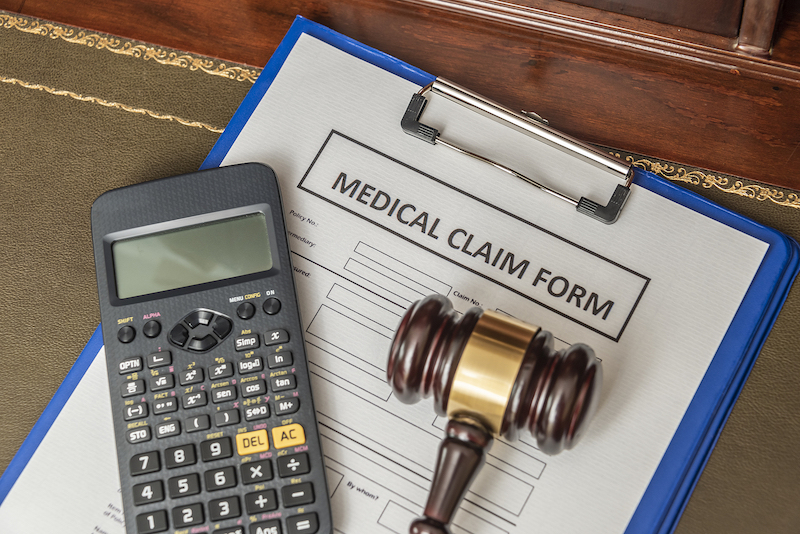People in the U.S. place enormous trust in the hands of physicians and health care systems. Unfortunately, more than a quarter of a million people die each year due to medical mistakes made by health care providers, making medical malpractice is the third leading cause of death behind heart disease and cancer.
When an individual becomes injured due to a medical error, it can give rise to a medical malpractice claim. The injured patient can seek compensation for the expenses and impacts of their injury through settlements with the health care provider’s medical malpractice insurance carrier or the civil court system with a medical malpractice lawsuit.
Medical malpractice is a complex area of the law, prone to creating questions and confusion. An experienced Chicago medical malpractice lawyer provides answers to your questions, helps you understand the claims process, and gives you information on the services we can provide to assist you with your claim.
What Is Medical Malpractice?
According to a study from Johns Hopkins University School of Medicine, nearly 10 percent of the deaths occurring in hospitals in the U.S. result from medical error. However, not all of these medical errors would necessarily result in a medical malpractice case. For a medical error to constitute medical malpractice, the following must apply:
- The error resulted in injury or wrongful death
- The error occurred when a medical professional, through medical negligence or omission, deviated from the standard of care. *
*Standard of care refers to the actions a reasonable and similarly positioned medical provider would have provided in the same situation. Some of the common forms of medical negligence that lead to medical malpractice lawsuits include:
- Diagnosis errors, such as delayed diagnosis, missed diagnosis, or misdiagnosis.
- Prescription errors, such as giving the patient the wrong medication or the wrong dosage.
- Anesthesia errors, such as administering too much or too little anesthesia during a surgical procedure.
- Surgical errors, such as unnecessary surgery, failing to provide surgery when medically indicated, wrong-site, or even wrong patient surgery.
- Birth injuries due to a medical error, such as failing to provide a needed Cesarean section or failing to diagnose a medical condition in the mother or infant that impacted the delivery process or the safety of the pregnancy.
- Failing to obtain adequate patient history or testing needed to properly diagnose and safely treat a medical condition.
- Failing to provide “informed consent”—information to the patient about the known risks of a treatment before obtaining their consent to the treatment method.
Doctors, hospitals, dental offices, medical clinics, pharmacies, surgical centers, surgeons, and others involved in delivering healthcare services can each face claims of medical malpractice. Errors made by medical staff such as nurses or nurses’ aids generally fall under the malpractice policy of the institution where they work. Doctors, however, are sometimes independent contractors with privileges to practice at medical facilities and carry different medical malpractice policies.
The Responsibilities of a Medical Malpractice Attorney
Medical malpractice claims are complicated. They require extensive knowledge of the legal process for seeking compensation from a liable party and knowledge of the medical field, medical negligence, medical treatments, and the type of compensation needed after an injury has occurred due to a medical error.
Personal injury lawyers experienced in medical malpractice can assist individuals seeking compensation for injuries that occurred at the hands of a medical professional.
Here is a look at some of the tasks a medical malpractice lawyer and their legal team can perform to assist you in seeking compensation for the expenses and impacts you incurred due to the medical negligence of a health care provider.
Determining Liability and Associated Insurance Resources
As noted above, there can be different sources of liability in a medical malpractice claim and even multiple sources of liability. A doctor can be legally responsible for the errors they commit and even errors that hospital staff committed under their instruction or supervision.
Additionally, the hospital can be liable for errors resulting from facility issues, such as an injury resulting from poorly maintained instruments or a failure to prevent hospital-acquired infections. Finally, the facility may be responsible for the errors of its employees.
Your medical malpractice attorney will carefully evaluate the details of your case to determine negligence and liability, and whether medical malpractice insurance policies may compensate you.
Establishing the Value of Your Claim
Medical malpractice claimants can seek compensation for expenses incurred due to the injury. Commonly claimed expenses include:
- Medical bills, such as the cost of medical treatment to correct the condition or repair the injury caused by the medical error
- The cost to treat future complications that are likely to arise due to the injury
- Lost income and wages resulting from the injury
- Loss of future earning capacity if the medical injury results in permanent injury or disfigurement
- The physical and emotional pain and suffering the client endured because of the error
Some states limit the compensation you can seek for non-economic damages (pain and suffering and emotional distress). Illinois law does not cap non-economic damages in medical malpractice cases. Factors that affect the value of your claim include:
- The amount of insurance coverage the at-fault party has
- The severity of your injury
- The likelihood of being able to return to work and earn an income
- The income you earned before the accident
- The clarity of liability in the claim
Working with Medical Professionals and Other Experts
Illinois law requires that if you file a medical malpractice claim in court in the form of a medical malpractice lawsuit, you must include an Affidavit of Merit. This affidavit requires your attorney to review the details of your claim with a medical professional who practices or teaches the same area of medicine that pertains to your case and to testify that the medical professional found that your claim of medical malpractice has merit.
If you file a medical malpractice lawsuit, your attorney and their legal team will likely communicate with other medical professionals about your case, as they must provide expert testimony about your injuries, the error that occurred, and the expected standard of care to elevate the evidence of your case.
Gathering Evidence
Evidence is a crucial part of your medical malpractice claim. Your medical malpractice lawyer will seek to prepare the following information:
- Witness testimony from hospital staff members who were present when the medical negligence occurred.
- Medical records from both the treatment you received when the error occurred and the treatment received to address the medical mistake.
- Testimony regarding your prognosis after the error, including the likelihood of permanent deficits that will prevent you from earning an income.
- Hospital policies, procedures, and training manuals that can show the treatment you received deviated from the facility’s established standard of care.
- The provider’s history of performance, such as proof of any disciplinary actions or previous claims that would indicate a history of carelessness
Negotiating a Settlement and Managing Communication With the Insurance Provider
It is difficult to prove medical negligence in medical malpractice cases, but it is not impossible. Many victims don’t even know that they can—and should—seek compensation via a medical malpractice claim after experiencing an injury at the hands of a medical provider. Most health care provider errors that result in injury do not result in legal action. In cases that do result in legal action, only 7 percent will go to trial while the rest find a resolution outside of the courtroom.
Settlement is a common method of resolving medical malpractice claims, and the settlement negotiation process generally begins when your medical malpractice lawyer submits the claim in the form of a demand package to the at-fault party’s insurance provider. The package includes details about the error and the impacts you incurred, documentation of your expenses, and a demand for the overall value of the claim.
If the medical malpractice insurance provider does not opt to pay the claim outright or deny the claim and provide a reason for the denial, they can offer to settle the claim for less compensation than is requested.
Your attorney can negotiate to increase this offer to a compensatory amount that you will agree to accept. In addition to settlement negotiations, your attorney will manage all communication with the insurance provider on your behalf to protect your claim from well-known insurance tactics used to avoid making high payouts against their insured.
Filing Medical Malpractice Cases in Court
Medical malpractice cases have a statute of limitations, or deadline, by which you must file your claim. There are many court formalities involved in filing legal claims, and your attorney and their legal team are responsible for meeting the legal requirements for your claim.
One common requirement for medical malpractice claims in many states is that, before the claim is filed in court, the provider who is subject to the claim must be notified of the issue and granted time to further investigate the claim. Once you file the claim, your medical malpractice case moves to the discovery process where your attorney can depose witnesses out-of-court to gather additional evidence to bolster your claim.
Litigation Services
The settlement negotiation process can continue even after you file your medical malpractice case in court. If you don’t resolve your claim before the trial, your attorney may provide litigation services, including the delivery of opening and closing arguments, presentation of evidence, and examination of witnesses. Simultaneously, they can also entertain settlement offers from the defendant. You may decide on any settlement offer as long as the court has not yet decided on the matter.
Collect Your Settlement or Award
Medical malpractice lawyers generally work on a contingent fee basis. This means that you sign a contract with the attorney that allows you to withhold payment for their services until there is a positive outcome to your claim.
Once a settlement or award resolves the case, your attorney receives a percentage of the compensation, as outlined in the agreement. After a settlement agreement or a court decides the amount of compensation, the medical malpractice insurance provider will process the payment and send it to your attorney. From there, the attorney will deduct their payment and any expenses they are responsible for covering according to your contingent fee agreement and then forward the remainder of the compensation to you.
Why Hire a Chicago Medical Malpractice Lawyer?
If you or your loved one suffered harm due to the medical negligence of a healthcare professional in Chicago or throughout Illinois, you may have grounds to recover compensation through a claim of medical malpractice. Our Chicago medical malpractice lawyers have years of experience helping medical malpractice victims obtain fair compensation for their injuries. Contact our legal team today.
Contact the Chicago Medical Malpractice Law Firm of Zayed Law Offices Personal Injury Attorneys for Help Today
For more information, please contact the experienced Chicago medical malpractice lawyers at Zayed Law Offices Personal Injury Attorneys today. We offer free consultations.
We proudly serve Cook County, Will County, Kendall County, and its surrounding areas:
Zayed Law Offices Personal Injury Attorneys – Chicago Office
10 S La Salle St STE 1230, Chicago, IL 60603
Phone:(312) 726-1616
Hours: Open 24/7
Our firm is located near you. We have an office in Chicago
Find us with our GeoCoordinates: 41.8815493,-87.6327515
Zayed Law Offices Personal Injury Attorneys – Joliet Office
195 Springfield Ave, Joliet, IL 60435
Phone: (815) 726-1616
Our firm is located near you. We have an office in Joliet
Find us with our GeoCoordinates: 41.5254295,-88.1381011













